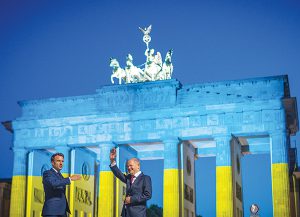Debates among German intellectuals are usually so vapid, pretentious and painful to behold that I hesitate to wish the experience even on my worst enemies. But I’m making an exception for a phenomenon I’ll call the War of Open Letters.
This ongoing philosophical conflict is about the brutal attack by Russian President Vladimir Putin on Ukraine, and the appropriate reaction to it by Germany and, implicitly, the Western alliance. To my surprise, the controversy has the potential to become
enlightening.
It began, as such matters are wont to do in the “land of poets and thinkers,†with a prolix treatise by a philosopher — one of Germany’s best known and most overrated, Juergen Habermas. Even a brave
attempt to translate it into English doesn’t do justice
to the convoluted pomposity of the original text’s
run-on sentences, apparently crafted with the intent of hedging against any ensuing criticism arising from accidental clarity.
In a nutshell, Habermas argues that critics of German Chancellor Olaf Scholz are wrong to demand clearer communication and bolder action in sending weapons to Ukraine. That’s because, Habermas thinks, the topic is so complex that you need philosophers like him to explain it.
Yes, Ukraine has a right to defend itself, he concedes, but if we — Germany and the West — do something Putin chooses to interpret as participation in the war, we might suddenly find ourselves in World War III, and Putin could nuke us. So Scholz is right to take small steps and stick to nuance.
Inspired by Habermas’ verbiage, a group of mostly leftist celebrities around Alice Schwarzer, Germany’s most prominent feminist, then published an “open letter†to Scholz.
More than 260,000 people had signed it. Again invoking the risk of a Third World War and nuclear Armageddon, the signatories urge Scholz to go back to his original policy of not sending weapons to Ukraine, lest that provoke Putin.
They add that the responsibility of nuclear escalation would lie not only with “the original aggressor†(that is, Putin) but also with “those who, with their eyes wide open, provide him with a motive.†That would be us, presumably, for helping the Ukrainians defend themselves. It gets worse. The authors believe that decisions weighing the cost in Ukrainian lives
don’t lie “exclusively†with Ukraine, but are “universal.†All of us, apparently, will get to vote on when enough is enough and it’s time for Ukraine to capitulate. The signatories conclude by urging Scholz to negotiate peace — an outcome which, they seem to believe, is no longer up to Putin but in the power of a German chancellor.
Before February 2022, such timorous moralising would have been de rigueur in post-war Germany’s
faux-pacifist tradition. But when Scholz proclaimed a “watershed†in German policy towards Russia it sounds dissonant. Online, many Germans derided the open letter’s “sofa pacifism.â€
But to get in the first good jab, it took a man who looks and sounds like a genuine Ukrainian hero. Wladimir Klitschko is — like his brother Vitali, the mayor of Kyiv — a former world champion in heavyweight boxing. Both are now defending their country. They also speak fluent German. So Wladimir took to the Op-Ed pages of a German newspaper and replied to the open letter.
After listing the atrocities committed by Russia in Ukraine up to that point, Klitschko reminded the epistlers that Ukrainians didn’t start this war; that, yes, they’ll keep defending themselves; and that they need weapons. And no, they won’t give up their existence as a country and democracy to please a few “intellectuals, who’ve lost all sense of reality and reason.â€
With that, Germany was ready for the next open letter to Scholz (which already has more than 64,000 signatories). This one was drafted by other intellectuals, from across the spectrum. It praises Scholz’s new policy of arming Ukraine and counsels fortitude. Then it homes in on the crux.
“The threat of nuclear war is part of Russia’s psychological warfare,†the authors write. But “if Putin’s armed revisionism in Ukraine succeeds, the danger grows that the next war will take place on Nato territory.†If he wins now, he’ll go on — to Moldova, the Baltics and who knows where else.
“The danger of nuclear escalation,†they conclude, “must be countered by credible deterrence.â€
What they didn’t say but could have added is that Putin isn’t the only one who could resort to nuclear blackmail in this new and frightening era. The world currently has nine states with nukes, and will probably have more.
If Putin is seen to be victorious by threatening a “tactical strike,†he and others will be tempted to do the same in subsequent conflicts. Yielding to his bullying now wouldn’t keep us safe; it would put all of us in even greater danger.
And so the sparring continues, as the dueling signatories hop from one TV talk show to another. What began as pompous drivel is slowly clarifying into lucid insight, like a lotus flower that grows out of mud but blossoms when it sees sunlight.
—Bloomberg
Andreas Kluth is a Bloomberg Opinion columnist covering European
politics. A former editor in chief of Handelsblatt Global and a writer for the Economist, he is author of
“Hannibal and Meâ€
 The Gulf Time Newspaper One of the finest business newspapers in the UAE brought to you by our professional writers and editors.
The Gulf Time Newspaper One of the finest business newspapers in the UAE brought to you by our professional writers and editors.

